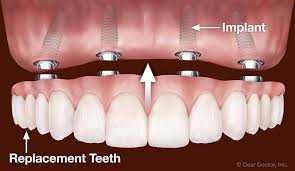Fixed Replacement
BRIDGE
Teeth can be replaced with a fixed bridge if there are teeth in the area that are adequate in number and sufficiently healthy and strong to support the artificial teeth. In order to fabricate a bridge, the adjacent teeth are prepared by reducing their size and making room for the prosthetic tooth restoration.
The limitation of this form of treatment has to do with the irreversible preparation of the adjacent teeth for support. Long-term, fixed bridges between natural teeth have an average life expectancy of 8-12 years before requiring replacement.
The bridges can be fabricated in metal (gold or ni-cr alloy), porcelain fused to metal or complete porcelain to give it a translucency very close to that of a natural tooth.
IMPLANTS
 A dental implant is a artificial tooth root that a doctor places in your jaw to hold a replacement tooth or bridge. The implant fixture is first placed, so that it is likely to Osseo-integrate, then a dental prosthetic is added. A variable amount of healing time is required for osseointegration before either the dental prosthetic (a tooth, bridge or denture) is attached to the implant or an abutment is placed which will hold a dental prosthetic.
A dental implant is a artificial tooth root that a doctor places in your jaw to hold a replacement tooth or bridge. The implant fixture is first placed, so that it is likely to Osseo-integrate, then a dental prosthetic is added. A variable amount of healing time is required for osseointegration before either the dental prosthetic (a tooth, bridge or denture) is attached to the implant or an abutment is placed which will hold a dental prosthetic.
Success or failure of implants depends on the health of the person receiving it, drugs which impact the chances of osseointegration and the health of the tissues in the mouth. The amount of stress that will be put on the implant and fixture during normal function is also evaluated. Planning the position and number of implants is key to the long-term health of the prosthetic since biomechanical forces created during chewing can be significant.
Opening Hours
- Mon to Sat -
10:30am - 06:30 pm
- Sunday Closed